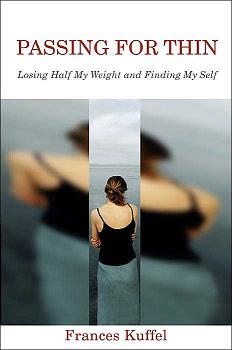Passing for Thin
Frances Kuffel
nonfiction, autobiography
Reviewed by: Carrie Byrd
Review posted: 6/18/04
Passing for Thin is another memoir in a market already flooded with them. What makes this one different? Why should you read it? What is its hook? Those are all good questions. This book is the story of Frances Kuffel and her journey from being a massively overweight woman to be a thin little thing, and how she had to come to terms with her food addiction.
Kuffel starts the story with a picture of her as a child. Furtively sneaking food, worrying over being caught, not yet fat but already on her way, it is a disturbing picture. More disturbing is Kuffel’s fruitless search for a reason behind her eating. She posits that the fact she was adopted might have been the motivator. She suggests that her older brother, Dean, was a threat, physically, and also hints sinisterly that her weight gain was a protection from his sexually. After the first few chapters neither of these are ever mentioned again, and one must wonder about their being included at all. Why suggest two such potentially damaging things only to drop them entirely? Were they supposed to be the hook to draw us in? Were we supposed to feel sorry for her? I wonder what her parents said when they read it. What did Dean think when he realized he’d been pegged as someone who his own sister thought of as a predator?
 After that brief prelude we move into Kuffel’s adult life, shortly before she confronts her addiction to food. She’s unhappy with her job, she’s overweight, and apparently her best friend is an alcoholic. His alcoholism leads her to the revelation that she overeats in the same compulsive manner, and she begins attending Overeater’s Anonymous meetings. From there, the book moves rapidly, as does her weight loss. But with that sudden loss Kuffel also encounters a loss of identity. All her life she was the fat girl. She realizes that she doesn’t know how to be thin, or what it really means about her place in society.
After that brief prelude we move into Kuffel’s adult life, shortly before she confronts her addiction to food. She’s unhappy with her job, she’s overweight, and apparently her best friend is an alcoholic. His alcoholism leads her to the revelation that she overeats in the same compulsive manner, and she begins attending Overeater’s Anonymous meetings. From there, the book moves rapidly, as does her weight loss. But with that sudden loss Kuffel also encounters a loss of identity. All her life she was the fat girl. She realizes that she doesn’t know how to be thin, or what it really means about her place in society.
This journey of discovery is the meat of the book, and Kuffel is not afraid to reveal the details of her struggle. She is human, and you know she is human, and given that she conquered what might have seemed like insurmountable difficulties to readers, her accomplishments are undeniably impressive. In spite of that, however, I found her neither likable nor sympathetic. She mentions several times how she uses sarcasm as a shield and humor as her primary defense. That sarcasm seems to come through in the book as a sort of humorless spite. She doesn’t like other overweight women, dropping them into unflattering categories such as “fag hag” ”zaftig” and “orphan”. In fact, there are few people who Kuffel seems to like, and I’d venture to say she doesn’t include herself on that list.
The fact that I dislike Kuffel leaves me with mixed feelings about the book. It is compelling written. Other than the random ideas that seem to exist primarily so that Kuffel can use them as catalysts for self-realization (such as an abusive brother or alcoholic friend) that get mentioned and then disappear, the book moves quickly and seamlessly. But where I should have been engaged, I was not. Where I might have cried for Kuffel’s struggles and self-doubt, I was detached. Had this memoir been written by someone I could have brought myself to care about as more than an abstract concept, it could have been brilliant.
|




 After that brief prelude we move into Kuffel’s adult life, shortly before she confronts her addiction to food. She’s unhappy with her job, she’s overweight, and apparently her best friend is an alcoholic. His alcoholism leads her to the revelation that she overeats in the same compulsive manner, and she begins attending Overeater’s Anonymous meetings. From there, the book moves rapidly, as does her weight loss. But with that sudden loss Kuffel also encounters a loss of identity. All her life she was the fat girl. She realizes that she doesn’t know how to be thin, or what it really means about her place in society.
After that brief prelude we move into Kuffel’s adult life, shortly before she confronts her addiction to food. She’s unhappy with her job, she’s overweight, and apparently her best friend is an alcoholic. His alcoholism leads her to the revelation that she overeats in the same compulsive manner, and she begins attending Overeater’s Anonymous meetings. From there, the book moves rapidly, as does her weight loss. But with that sudden loss Kuffel also encounters a loss of identity. All her life she was the fat girl. She realizes that she doesn’t know how to be thin, or what it really means about her place in society.